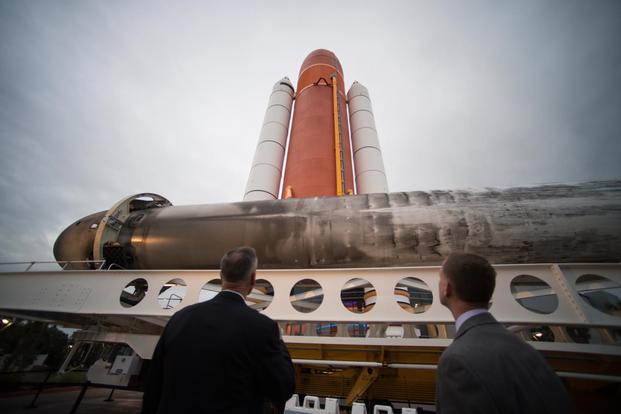Vice President Mike Pence announced Tuesday that President Donald Trump has signed a memorandum creating the latest unified, combatant command: U.S. Space Command.
"It is my privilege to announce that today, President Trump will direct the Department of Defense to establish a combatant command that will oversee all of our military activities in space," Pence said at the Kennedy Space Center at Cape Canaveral, Florida.
Pence had planned to make the announcement during the latest SpaceX launch to send the U.S. Air Force's next-generation GPS III satellite into space. The launch itself was pushed back until Wednesday.
Pence said the command, which will be the 11th combatant command, is the stepping stone to creating a U.S. Space Force.
Related content:
- Skinny Space Force? Budget Analyst Says a $3 Billion Service Is Possible
- Key Space Force Directive Missing from White House Meeting Agenda
- United States Space Force
"In the days ahead, President Trump will also sign a new space policy directive that will lay out our plans and our timeline to create the new sixth branch of the armed forces, the U.S. Space Force," Pence said. "We're working as we speak with leaders in both parties in Congress."
The creation of a separate space command was anticipated before the end of the year.
DefenseOne reported in July that the DoD intended to create a new combatant command solely focused on space before lawmakers begin debating a Space Force proposal in the fiscal 2020 budget.
While creating a new, separate branch within the DoD, as ordered by the president, requires congressional approval, the Pentagon said it has the authority to create a combatant command, DefenseOne said at the time, referencing a draft report outlining the decision.
"It is urgent that we address space as a warfighting domain, and this combatant command is a critical step in that direction," Deputy Defense Secretary Patrick Shanahan tweeted Tuesday after the vice president's speech.
"U.S. Space Command will allow us to accelerate our space capabilities to defend our national interests and deter our adversaries," said Shanahan, considered the Pentagon's leading architect of the Space Force proposal.
"Once both organizations are fully operational, the differences between Space Force and U.S. Space Command will largely parallel those of the other five military services and four functional combatant commands," he said, referring to Strategic Command, overseer of the U.S.' nuclear arsenal; Transportation Command, which manages mobility and transportation for the military; Cyber Command, both an offensive and defensive force for bolstering U.S. cyber capabilities; and Special Operations Command, which is in charge of all special operations missions across the Army, Marine Corps, Navy and Air Force.
"The Space Force will serve as a force provider for personnel, assets and capabilities supporting space operations, while Space Command will serve as the operational command that will employ space capabilities and lead space operations," he added.
The news comes as Congress is set to debate how best to execute the Trump administration's proposal to create a more robust space entity.
"We will work with Congress to determine the timeline to full operational capability for US Space Command," Shanahan said.
-- Oriana Pawlyk can be reached at oriana.pawlyk@military.com. Follow her on Twitter at @Oriana0214.









